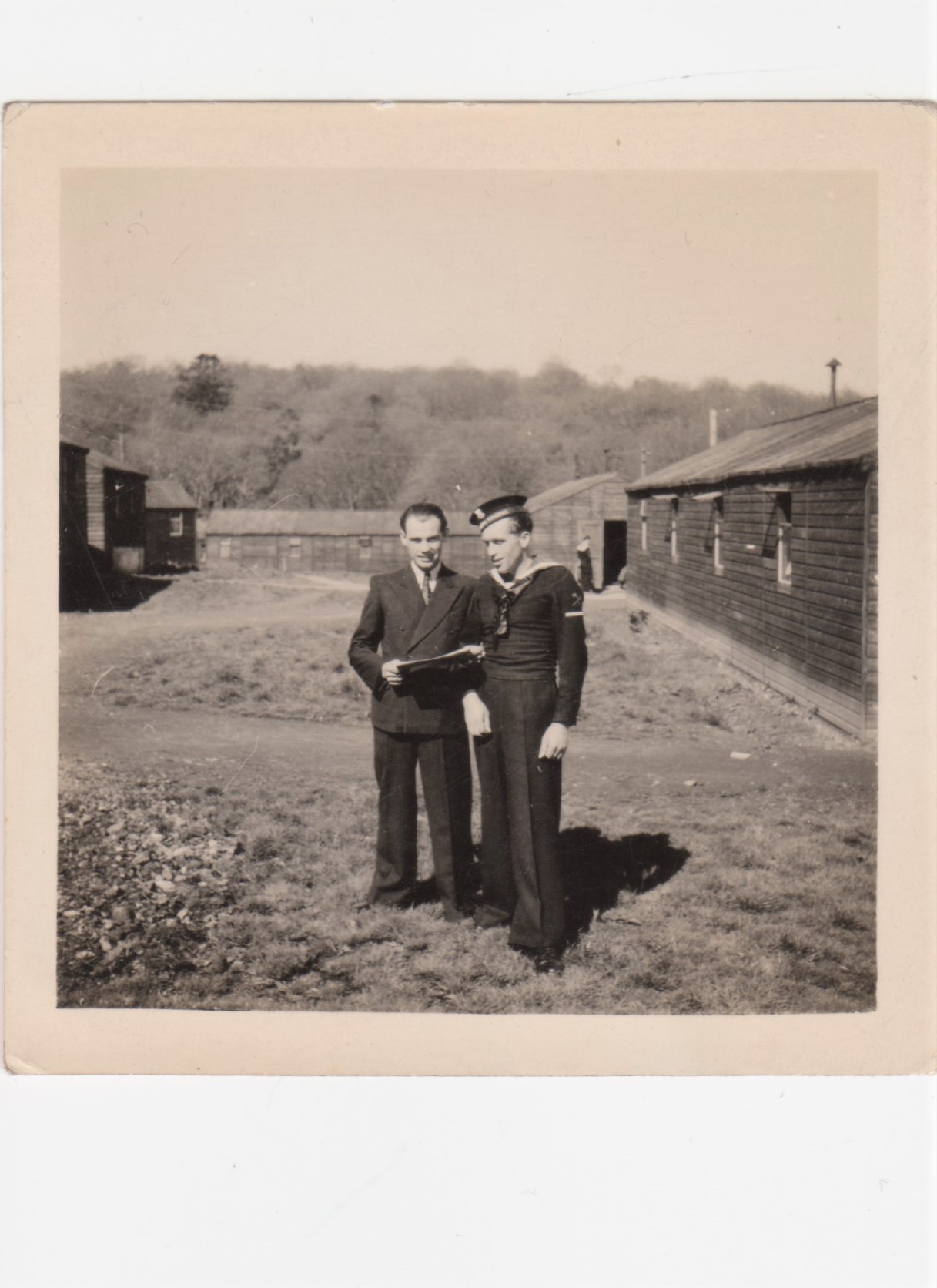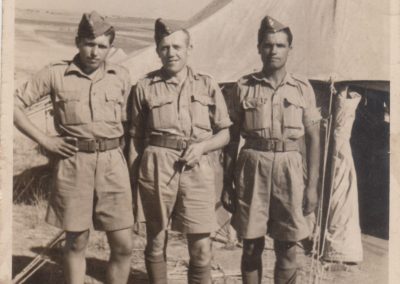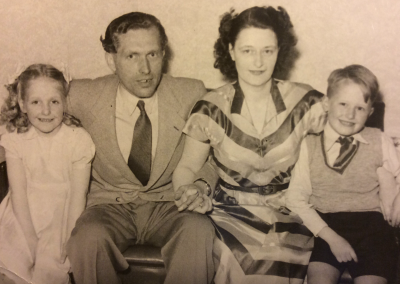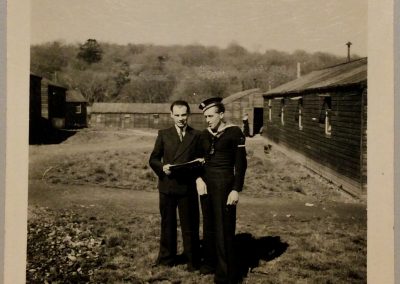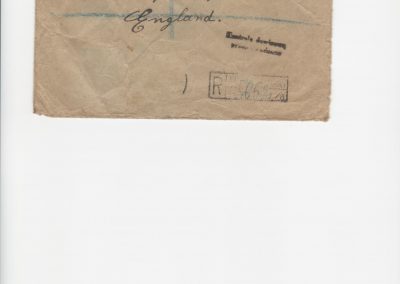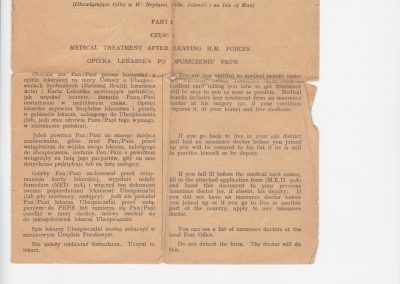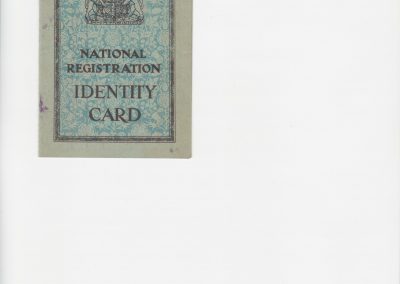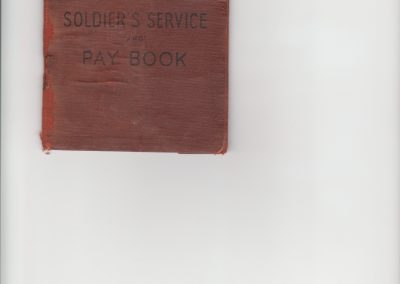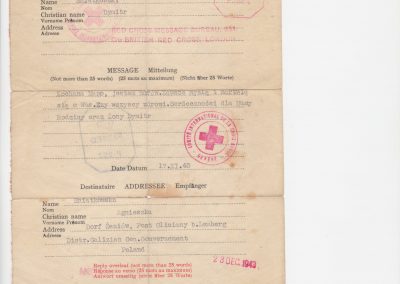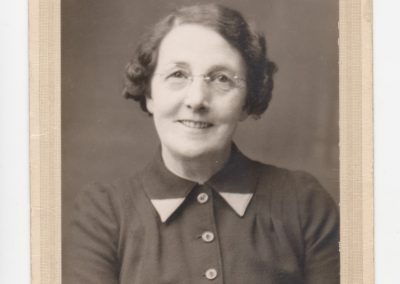This account of Dymitro (Michael) Sniatkowski’s life has been written by his granddaughter, Kathy Sniatkowski.
In 1940, when he was 22, my grandfather was taken prisoner by the Russians and moved by train to a work camp near Baku. The train stopped halfway and the men onboard were let off into an area enclosed by barbed wire. The border of the area was ploughed, and the men were told that if they stepped foot on the ploughed earth, they’d be shot. That night several men ran toward the fence anyway. I can’t imagine the fear that made them do it.
Before he was arrested, my grandfather had just finished his apprenticeship to become a tailor. He and his sister Maria were planning to open a shop together. The last time he ever saw his father, or any of his family, his father was collapsing in grief in his mother’s arms as the train pulled out of the station.
The conditions in the work camp were horrific. My mom remembers my grandfather telling a story about stealing a cabbage from a garden as the prisoners marched past it one day, and making soup for everyone when he got back to the camp. The men were desperate and starving and there was never enough food to go around.
When the Russians became allies of England my grandfather was freed from the work camp, but he didn’t know where to go. He and a friend spent some time in the Middle East. My dad said that the two of them went back and forth on the train. One town had lots of tobacco but no sausages, the other town had sausages but no tobacco, so they travelled between the two places and collected their profits. One day somebody told them to get onto a certain train if they were Polish and wanted to join the army. They decided it was their best chance, but were worried that the army would want to know where their money came from, so they buried it all in a coffee can in the sand. It may still be out there somewhere…
My dad said that my grandfather joined the army in Persia, then ended up driving convoys in South Africa. Eventually he was evacuated to England. My dad thinks it may have been to Scotland instead. Either way, it was on a very fancy cruise ship, converted to a hospital ship, possibly the Queen Mary. My grandfather remembered sneaking a peak of the ballroom, even though the area was prohibited to soldiers. In England (or perhaps Scotland) my grandfather entered paratrooper training. The men in that program were made to work until they dropped. Eventually my grandfather joined the navy instead, but not until he had jumped out of an airplane at least once.
-

Dymitro (Michael) Sniatkowski in Persia (Kathy Sniatkowski collection)
-

Dymitro and his family (Kathy Sniatkowski collection)
-

Dymitro at the camp
-

A letter to the camp (Kathy Sniatkowski collection)
-

Discharge papers (Kathy Sniatkowski collection)
-

National Identity Card (Kathy Sniatkowski collection)
-

Pay book (Kathy Sniatkowski collection)
-

Red Cross telegram to Dymitro's family in Poland reporting that he was safe and thinking of them (Kathy Sniatkowski collection)
At some point in his training or when he was in the navy, my grandfather became very sick and was sent to a hospital called Edenhall. It was located in Musselburgh, near Edinburgh, Scotland, and a lot of Polish soldiers spent time there. It’s where my grandparents met. My grandmother had gone there with a friend to visit another patient and my grandfather was in the next bed.
My grandparents were married in December of 1944. My grandmother had to give up her British citizenship because she married a Polish man, and had to inform the government of her whereabouts if she crossed the border into England. Eventually she got her citizenship back, but it was strange to be treated like a foreigner in the country she was born in.
While my grandfather stayed at the camp in Okehampton, my grandmother stayed with 2 different families in the town. My grandmother was from Dundee, and started working in the jute mills at the age of 14. She said that Okehampton was the most beautiful place she had ever seen, and she loved her time there. She kept this photo of one of the women she stayed with her whole life:
I was told that Daisie had an “AGA cooker” in her kitchen, which my grandmother had never seen before. It had a lid over the burner and stayed warm all the time. Daisie showed her how to make Devonshire cream, and Cornish pasties.
There might be a lot of stories out there about people in Okehampton who rented out rooms during the war. I know that housing was very hard to find. My grandmother also said that the Polish men and the locals were ordered to take alternate nights at the pubs in town after whatever altercation happened between them. There were definitely some hard feelings between the locals and the men at the camps.
My dad said that when my grandfather was in the camp at Okehampton, he taught tailoring to some of the men in the hopes that it would help them find work after the war. My grandfather wanted to stay in England, and found a job as a tailor with a man in Plymouth, but the local union wouldn’t accept his qualifications. My grandparents made arrangements to move back to Dundee, but things there were difficult too. Eventually they decided to come to Canada.
My grandfather died in 1992, when I was in high school. I didn’t hear a lot of his stories. My dad said that my grandfather really didn’t like to talk about that time, and was also warned not to talk about it. I spent a lot of time with my grandmother. Her memory was incredible, and I loved her stories. I know a lot about my family through her and I’m so grateful for it. I’m very grateful for hearing more about Okehampton from the Telling Our Stories project this year too!
Kathy would love to know more about Daisie, and to connect with her family. Please get in touch with us here if you know of Daisy or her family.

